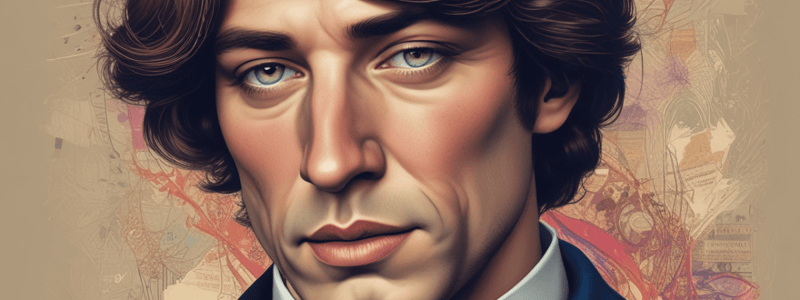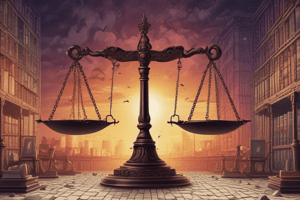Podcast
Questions and Answers
What is the main focus of the passage's exploration of the principle of wrongfulness in relation to criminalization?
What is the main focus of the passage's exploration of the principle of wrongfulness in relation to criminalization?
- The prosecution of famous and beloved Irish playwrights in 19th century England
- The criminalization of homosexuality in 19th century England and the prosecution of Oscar Wilde (correct)
- The role of the process of criminalization in punishing behavior deemed criminal by society
- The criminalization of heterosexuality in 19th century England
Why was Oscar Wilde able to display the close companionship of other men in public without arousing suspicion?
Why was Oscar Wilde able to display the close companionship of other men in public without arousing suspicion?
- Because he was a foreigner and an artist, and society thought his closeness to these men was simply because he was different (correct)
- Because he was famous and beloved, and society was unwilling to criminalize the behavior of such a prominent figure
- Because he was a wealthy man, and society did not expect wealthy men to engage in homosexual love affairs
- Because he dressed flamboyantly and socialized with important people, which drew attention away from his romantic relationships
What does the passage suggest about the role of criminalization in the prosecution of Oscar Wilde?
What does the passage suggest about the role of criminalization in the prosecution of Oscar Wilde?
- Criminalization was a necessary process to prohibit and punish Wilde's behavior, which was a threat to society
- Criminalization was a misused principle, as Wilde's only crime was having a sexual orientation that society deemed wrongful (correct)
- Criminalization was used to deter and punish Wilde's behavior, which was deemed wrongful by society
- Criminalization played no significant role in the prosecution of Wilde, as he was targeted for his status as a wealthy and famous artist
What is the 'beating heart' of criminal law, according to the passage?
What is the 'beating heart' of criminal law, according to the passage?
What is the significance of Oscar Wilde's status as a 'wealthy and brilliant writer living in London' in the context of the passage?
What is the significance of Oscar Wilde's status as a 'wealthy and brilliant writer living in London' in the context of the passage?
What is the main message or lesson the passage aims to convey about the principle of criminalization?
What is the main message or lesson the passage aims to convey about the principle of criminalization?
What was the main reason behind the Marquis of Queensbury's demand that his son stop seeing Oscar Wilde?
What was the main reason behind the Marquis of Queensbury's demand that his son stop seeing Oscar Wilde?
What evidence did Edward Carson present during the trial that proved damaging for Wilde?
What evidence did Edward Carson present during the trial that proved damaging for Wilde?
What were the two key principles said to justify the criminalization of an act?
What were the two key principles said to justify the criminalization of an act?
What did the 1895 Criminal Law Amendment Act in England prohibit?
What did the 1895 Criminal Law Amendment Act in England prohibit?
Which principle, according to the text, is based on subjective morality rather than objective harm?
Which principle, according to the text, is based on subjective morality rather than objective harm?
Why did Wilde's arrest become inevitable, despite his status and discretion?
Why did Wilde's arrest become inevitable, despite his status and discretion?
What did Wilde state about love between two men during his trial?
What did Wilde state about love between two men during his trial?
What did Wilde call love between two men in his famous statement during the trial?
What did Wilde call love between two men in his famous statement during the trial?
Which of the following individuals tried to persuade Wilde to drop his libel case against the Marquis of Queensbury?
Which of the following individuals tried to persuade Wilde to drop his libel case against the Marquis of Queensbury?
What was Wilde's demeanor during the initial stages of the trial?
What was Wilde's demeanor during the initial stages of the trial?
What was Oscar Wilde's primary offense that led to his imprisonment?
What was Oscar Wilde's primary offense that led to his imprisonment?
According to the passage, what was the impact of Wilde's trial on societal perceptions of homosexuality?
According to the passage, what was the impact of Wilde's trial on societal perceptions of homosexuality?
How did the principle of 'wrongfulness' influence the criminalization of homosexuality during Wilde's time?
How did the principle of 'wrongfulness' influence the criminalization of homosexuality during Wilde's time?
According to the passage, how has society's perspective on homosexuality evolved over time?
According to the passage, how has society's perspective on homosexuality evolved over time?
According to the passage, how did Oscar Wilde's imprisonment impact his later life and career?
According to the passage, how did Oscar Wilde's imprisonment impact his later life and career?
Which of the following best describes the purpose of the questions posed at the end of the passage?
Which of the following best describes the purpose of the questions posed at the end of the passage?
Flashcards are hidden until you start studying




